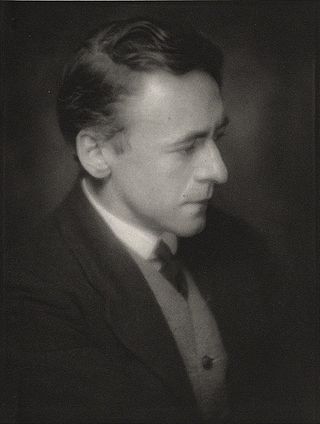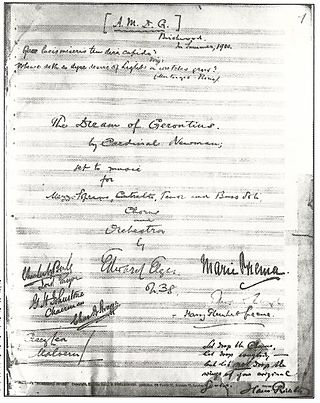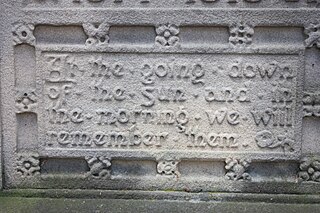Related Research Articles

Sir Arnold Edward Trevor Bax was an English composer, poet, and author. His prolific output includes songs, choral music, chamber pieces, and solo piano works, but he is best known for his orchestral music. In addition to a series of symphonic poems, he wrote seven symphonies and was for a time widely regarded as the leading British symphonist.

The Dream of Gerontius, Op. 38, is a work for voices and orchestra in two parts composed by Edward Elgar in 1900, to text from the poem by John Henry Newman. It relates the journey of a pious man's soul from his deathbed to his judgment before God and settling into Purgatory. Elgar disapproved of the use of the term "oratorio" for the work, though his wishes are not always followed. The piece is widely regarded as Elgar's finest choral work, and some consider it his masterpiece.

"For the Fallen" is a poem written by Laurence Binyon. It was first published in The Times in September 1914. It was also published in Binyon's book "The Winnowing Fan : Poems On The Great War" by Elkin Mathews, London, 1914.
The Crown of India, was a masque, an elaborate theatrical presentation, staged in 1912 to celebrate the visit the preceding December of King George V and Queen Mary to Delhi for their coronation as Emperor and Empress of India. For this masque, the English composer Sir Edward Elgar wrote the music as his Op. 66, with a libretto by Henry Hamilton. The masque consisted of two tableaux: "The Cities of Ind" and "Ave Imperator!".
"The Blue Mountains" is a poem written by Alfred Noyes, and set to music by the English composer Edward Elgar. It was one of the songs written to be performed in the Pageant of Empire at the British Empire Exhibition in Wembley Park, London, on 21 July 1924.
"Shakespeare's Kingdom" is a poem written by Alfred Noyes and set to music by the English composer Edward Elgar. It was one of the songs written to be performed in the Pageant of Empire at the British Empire Exhibition on 21 July 1924.
"The Islands" is a poem written by Alfred Noyes, and set to music by the English composer Edward Elgar. It was one of the songs written to be performed in the Pageant of Empire at the British Empire Exhibition on 21 July 1924.
"The Heart of Canada" is a poem written by Alfred Noyes, and set to music by the English composer Edward Elgar. It was one of the songs written to be performed in the Pageant of Empire at the British Empire Exhibition at Wembley Park on 21 July 1924.
"Merchant Adventurers" is a poem written by Alfred Noyes, and set to music by the English composer Edward Elgar. It was one of the songs written to be performed in the Pageant of Empire at the British Empire Exhibition on 21 July 1924.
"Sailing Westward" is a poem written by Alfred Noyes, and set to music by the English composer Edward Elgar. It was one of the songs written to be performed in the Pageant of Empire at the British Empire Exhibition, Wembley Park, on 21 July 1924.
"A Song of Union" is a poem written by Alfred Noyes, and set to music by the English composer Edward Elgar. It was one of the songs written to be performed in the Pageant of Empire at the British Empire Exhibition on 21 July 1924, though this particular song was not performed at the Pageant.

The Fringes of the Fleet is a booklet written in 1915 by Rudyard Kipling (1865–1936). The booklet contains essays and poems about nautical subjects in World War I.
The Pageant of Empire was the name given to various historical pageants celebrating the British Empire which were held in Britain during the early twentieth century. For example, there was a small Pageant of Empire at the town of Builth Wells in 1909. In 1911 a giant Pageant of Empire took place at the Festival of Empire at the Crystal Palace in Sydenham, where thousands of amateur performers acted out historical scenes. The most notable was the Pageant of Empire which took place in London in 1924.
”XTC” ("Ecstasy") is a song with words and music written by the English composer Edward Elgar in 1930. It was his last song, and written for the soprano Joan Elwes.

”Quand nos bourgeons se rouvriront”("When the spring comes round") is a song for solo soprano, part of a staged recitation with orchestra Une voix dans le désert written by the English composer Edward Elgar in 1915. The words are by the Belgian poet Émile Cammaerts.
Une voix dans le désert("A Voice in the Desert") is a recitation, with a soprano soloist and orchestra, written by the English composer Edward Elgar in 1915 as his Op. 77. The French words are by the Belgian poet Émile Cammaerts.
Carillon is a recitation with orchestral accompaniment written by the English composer Edward Elgar as his Op. 75, in 1914. The words are by the Belgian poet Émile Cammaerts.
Pageant of Empire is the title given to a set of songs, to words by Alfred Noyes, written by the English composer Sir Edward Elgar and given important positions in the Pageant of Empire at the British Empire Exhibition at Wembley Park.
"Big Steamers" is a poem by Rudyard Kipling, first published in 1911 as one of his twenty-three poems written specially for C. R. L. Fletcher's "A School History of England". It appears in the last chapter of the book. It is intended for children, with the verses responding with facts and humour to their curiosity about the 'big steamers' - as the merchant ships are called.
Lewis Foreman is a musicologist and author of books, articles, programme notes and CD sleeve notes on classical music, specialising in British music. He has been particularly associated with the Dutton Epoch and Lyrita record labels and with the British Music Society. His biography of Arnold Bax, now (2024) in its third edition, was first published in 1983. He writes obituaries of composers and music record executives for The Independent. He is also a contributor to Grove Music Online.
References
- ↑ Kennedy, Michael (1987). Portrait of Elgar (Third ed.). Oxford University Press. pp. 181, 356. ISBN 0-19-284017-7.
- ↑ Moore, Jerrold Northrop (1984). Edward Elgar: A Creative Life. Oxford University Press. p. 768. ISBN 0-19-315447-1.
- Foreman, Lewis (ed.),"Oh, My Horses! Elgar and the Great War", Elgar Editions, Rickmansworth, 2001 ISBN 0-9537082-3-3
- Richards, Jeffrey "Imperialism and Music: Britain 1876-1953" (Manchester University Press, 2002) ISBN 0-7190-4506-1